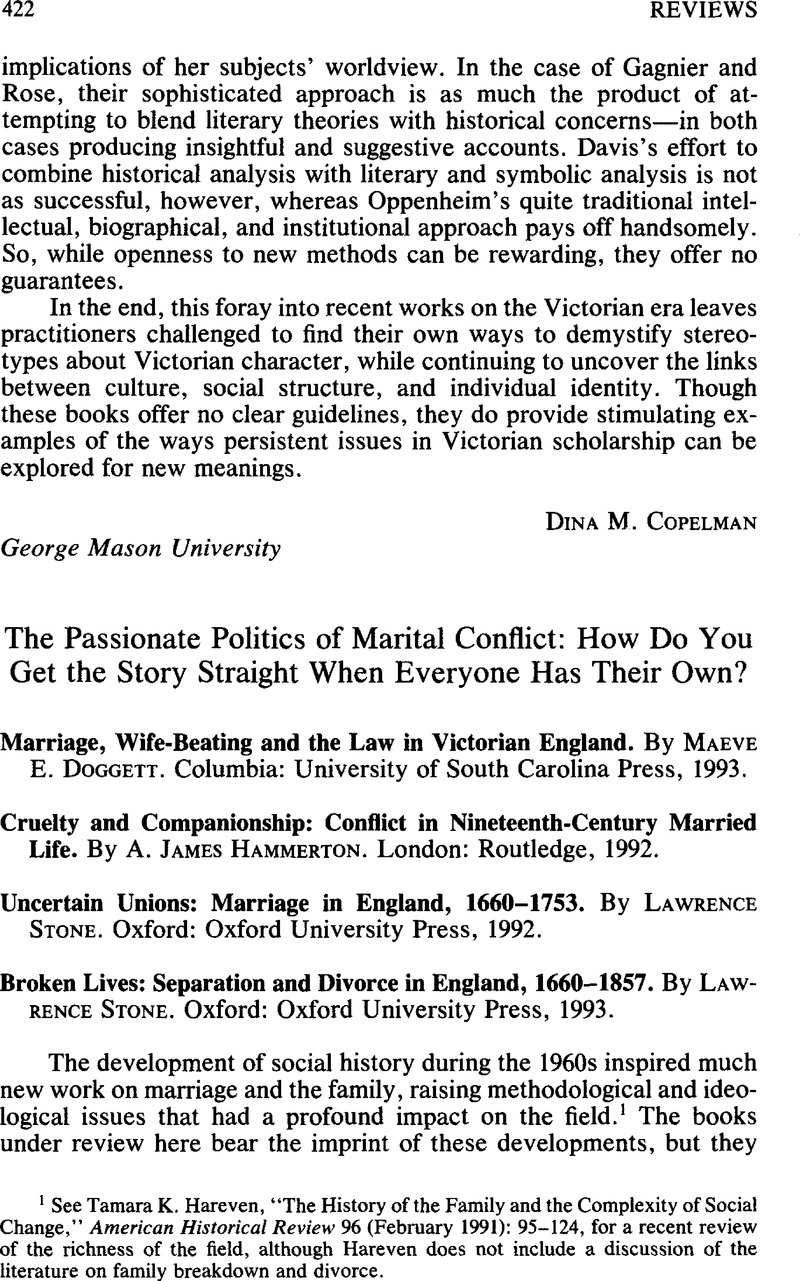No CrossRef data available.
Article contents
The Passionate Politics of Marital Conflict: How Do You Get the Story Straight When Everyone Has Their Own? - Marriage, Wife-Beating and the Law in Victorian England. By Maeve E. Doggett. Columbia: University of South Carolina Press, 1993. - Cruelty and Companionship: Conflict in Nineteenth-Century Married Life. By A. James Hammerton. London: Routledge, 1992. - Uncertain Unions: Marriage in England, 1660–1753. By Lawrence Stone. Oxford: Oxford University Press, 1992. - Broken Lives: Separation and Divorce in England, 1660–1857. By Lawrence Stone. Oxford: Oxford University Press, 1993.
Published online by Cambridge University Press: 10 January 2014
Abstract

- Type
- Reviews
- Information
- Copyright
- Copyright © North American Conference of British Studies 1995
References
1 See Hareven, Tamara K., “The History of the Family and the Complexity of Social Change,” American Historical Review 96 (February 1991): 95–124CrossRefGoogle Scholar, for a recent review of the richness of the field, although Hareven does not include a discussion of the literature on family breakdown and divorce.
2 Also reprinted in Stone, Lawrence, The Past and the Present (London: Routledge & Kegan Paul, 1981)Google Scholar. Since that time, of course, the issues raised by the concept of narrative have become much more complicated. See Stone, Lawrence, “History and Post Modernism,” Past and Present, no. 131 (May 1991): 216–17Google Scholar, and the ensuing discussions provoked by Stone's brief note that appeared in Past and Present, no. 133 (November 1992): 204–13Google Scholar, and Past and Present, no. 135 (May 1992): 189–208Google Scholar.
3 Stone, Lawrence, Road to Divorce: England, 1530–1987 (Oxford: Oxford University Press, 1990)CrossRefGoogle Scholar.
4 For a discussion of the variety of eighteenth-century documents revelatory of English married life, see Staves, Susan, “Where Is History but in Texts? Reading the History of Marriage,” in The Golden and the Brazen World: Papers in Literature and History, 1650–1800, ed. Wallace, John M. (Berkeley and Los Angeles: University of California Press, 1985), pp. 125–43Google Scholar.
5 For a discussion that challenges the privileged status the notion of “experience” enjoys among historians, see Scott, Joan, “Experience,” in Feminists Theorize the Political, ed. Butler, Judith and Scott, Joan W. (London: Routledge, 1992), pp. 22–40Google Scholar.
6 For the possibilities of formulating a history of emotional life, see Stearns, Peter N. with Stearns, Carol Z., “Emotionology: Clarifying the History of Emotions and Emotional Standards,” American Historical Review 90 (October 1985): 813–36CrossRefGoogle ScholarPubMed.




